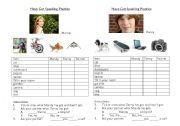
|
Have / Has got Speaking Practice Gapfill
This is a speaking gapfill to practice have got / has got
First, the student looks at the pictures and puts ticks or crosses in the column for Mandy or Danny.
Then the student asks his/her partner for the other information using:
Has Danny got a goldfish? No, he hasn�t.
Has Mandy gor a kite? Yes, she has.
There is a third colum...
Level: elementary
Age: 8-17
Type: worksheet
Downloads: 27
|
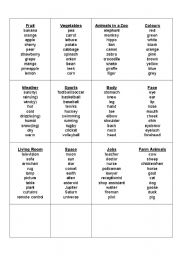
|
Shout It Out! Vocabulary Game
This is a larger version of the popular game Shout It Out!
The teacher makes a set of cards out of the worksheets.
The teacher puts the class into three or four teams. Each team selects a card but doesn�t look at it. The teacher gives the category to that team. They will then have 30 seconds to guess as many words as possible on the list and ...
Level: elementary
Age: 8-17
Type: activity-card
Downloads: 17
|
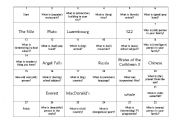
|
Superlatives Board Game
A board gmae to practise superlatives.
There are two types: facts and the student�s opinion. eg,
What is the tallest mountain? The tallest mountain is Everest. (the answers to these facts are dotted around the board)
What is the most difficult school subject? The most difficult school subject is maths.
The teacher should spend time to sha...
Level: elementary
Age: 8-14
Type: worksheet
Downloads: 27
|
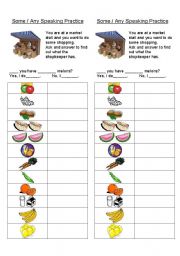
|
Some and Any Speaking Practice
The teacher needs to tick and cross some of the boxes before photocopying.
Students then have the following dialogue:
Do you have any lemons?
Yes I do. I have some lemons / No, I don�t. I don�t have any lemons.
Level: elementary
Age: 7-17
Type: worksheet
Downloads: 20
|
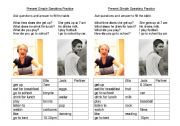
|
Present Simple Speaking Practice Gapfill
Students ask present simple questions using a variety of question words to fill the gaps:
What time does he get up?
How does he go to school?
What does he eat for breakfast?
They must then answer in full sentences �He likes...� �He eats� etc.
Then they ask each other in pairs and write the answers:
What time do you get up?
I get up a...
Level: elementary
Age: 8-17
Type: worksheet
Downloads: 23
|
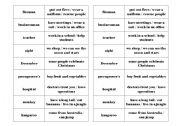
|
Relative Clause Matching and Speaking
Students match the word to the description and then must make sentences, for example
teacher work in a school / help children
�A teacher is a person who works in a school and helps children.�
This activity includes the relative pronouns which, that, who, where and where.
Level: intermediate
Age: 10-17
Type: activity-card
Downloads: 46
|
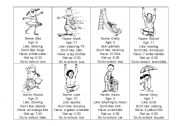
|
Children�s Alternative Identity Role Play Cards 2
These are part 2 of a 2 part set of cards that children can use to practise:
What�s your name? My name�s...
How old are you? I�m...
What do you look like? I have.../ I am...
What do you like? I like... but I don�t like...
What time do you get up? I get up at...
What do you have? I have...
How do you go to school?
Level: elementary
Age: 5-12
Type: activity-card
Downloads: 105
|
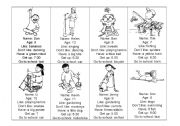
|
Children�s Alternative Identity Role Play Cards 1
These are part 1 of a 2 part set of cards that children can use to practise:
What�s your name? My name�s...
How old are you? I�m...
What do you look like? I have.../ I am...
What do you like? I like... but I don�t like...
What time do you get up? I get up at...
What do you have? I have...
How do you go to school?
Level: elementary
Age: 5-12
Type: activity-card
Downloads: 121
|
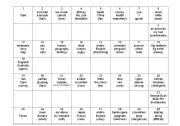
|
Comparative Board Game
A board game to practise comparatives.
Level: elementary
Age: 10-17
Type: worksheet
Downloads: 26
|
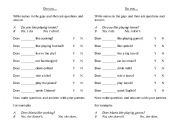
|
Present Simple Mingle
Students write their classmates� names in the spaces and then use present simple questions to find the answers. Students should also use short answers:
�Do you live in the city?�
�Yes, I do.�
Students circle Y or N.
Afterwards, this activity can be extended to practise he/she + present simple:
�Does X live in the city?�
�Yes, she does.�
Level: elementary
Age: 8-17
Type: worksheet
Downloads: 1
|